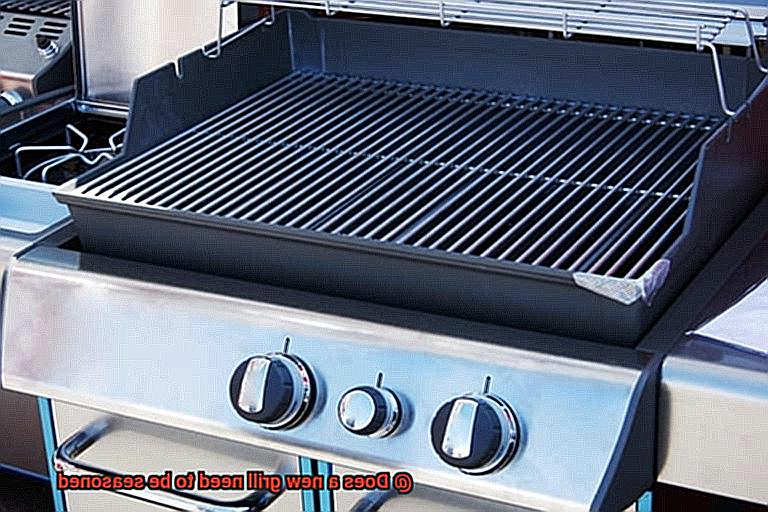Summer is almost here, and that means it’s time to dust off the grill and get ready for some delicious outdoor cooking. But if you’ve just purchased a brand new grill, you might be wondering whether or not it needs to be seasoned before use.
The debate over whether or not to season a grill is a hot one, with some people insisting it’s necessary while others claim it’s a waste of time. Seasoning involves coating the grates with oil and heating them up to create a non-stick surface that prevents food from sticking and protects against rust and corrosion.
So, does your new grill need to be seasoned? The answer isn’t straightforward since it depends on the type of grill and the manufacturer’s instructions. For instance, some gas grills come pre-seasoned and don’t require any additional seasoning, while some charcoal grills benefit from seasoning before their first use.
In this blog post, we’ll explore the benefits of seasoning your grill, different methods of doing so, and factors to consider when deciding whether or not to season your new grill. Whether you’re a grilling pro or a novice cook eager to learn more about outdoor cooking, keep reading for everything you need to know about seasoning your grill.
Contents
What is Seasoning a Grill?
Grilling is an art that requires skill and precision. Whether you’re a seasoned grill master or just starting out, taking care of your grill is essential for achieving the perfect cookout. One crucial step in maintaining a functional and non-stick grill is seasoning it.
Seasoning a grill isn’t just about adding flavor to your food. It’s the process of coating the grates with oil and heating them up to create a protective layer that prevents food from sticking and protects against rust and corrosion. Here’s everything you need to know about seasoning your grill:
- Clean your grill thoroughly: Before seasoning your grill, make sure to clean it thoroughly with a wire brush to remove any debris or rust. This will ensure that the oil can penetrate the metal and create an even surface.
- Coat the grates with oil: Use a high smoke point oil such as canola or vegetable oil to coat both sides of the grates evenly. You can use a paper towel or brush to spread the oil over the grates. This will help create a non-stick surface that makes cooking easier and more enjoyable.
- Heat up the grill: Fire up your grill and let it heat up for at least 15-20 minutes. This allows the oil to penetrate the metal and create a non-stick surface. A properly heated grill will also prevent food from sticking and burning.
- Let it cool down: Once the grill has heated up, turn it off and let it cool down completely before wiping off any excess oil with a clean paper towel. This will prevent any leftover oil from becoming rancid and affecting the flavor of your food.
It’s important to note that seasoning a grill is not a one-time process but rather a routine part of maintaining a healthy grill. You should repeat this process regularly, especially after each use, to maintain the non-stick surface and protect the grates from rust and corrosion.
Why Season a New Grill?
Firstly, seasoning your grill creates a non-stick surface that makes cooking and cleaning up a breeze. When you coat the grates with oil and heat them to a high temperature, it helps to prevent food from sticking and tearing apart. This means no more frustrating moments of trying to flip a burger or a piece of chicken, only to have it stick to the metal.
But that’s not all – seasoning your grill also has the added benefit of extending its lifespan. When you first buy your grill, there may be debris or manufacturing residue on the grates that needs to be removed. If left untreated, this can lead to rust and corrosion over time.
By seasoning your grill properly, you’re taking proactive measures to remove any unwanted substances and create a protective layer that will keep your grill in top shape for years.
And let’s not forget about flavor. When you cook on a new grill that hasn’t been seasoned, you may experience an unpleasant metallic taste in your food. This is because the metal hasn’t been treated yet. But by seasoning your grill with oil, you’re essentially infusing a layer of flavor that will enhance the taste of your food as you cook.
To season your new grill, follow these simple steps: start by cleaning it thoroughly with warm soapy water. Then, coat the grates with oil – vegetable or canola work well – using a brush or paper towel. Heat up the grill to a high temperature for about 15-20 minutes until the oil starts smoking. Turn off the heat and let the grill cool down completely before wiping off any excess oil with a clean paper towel.
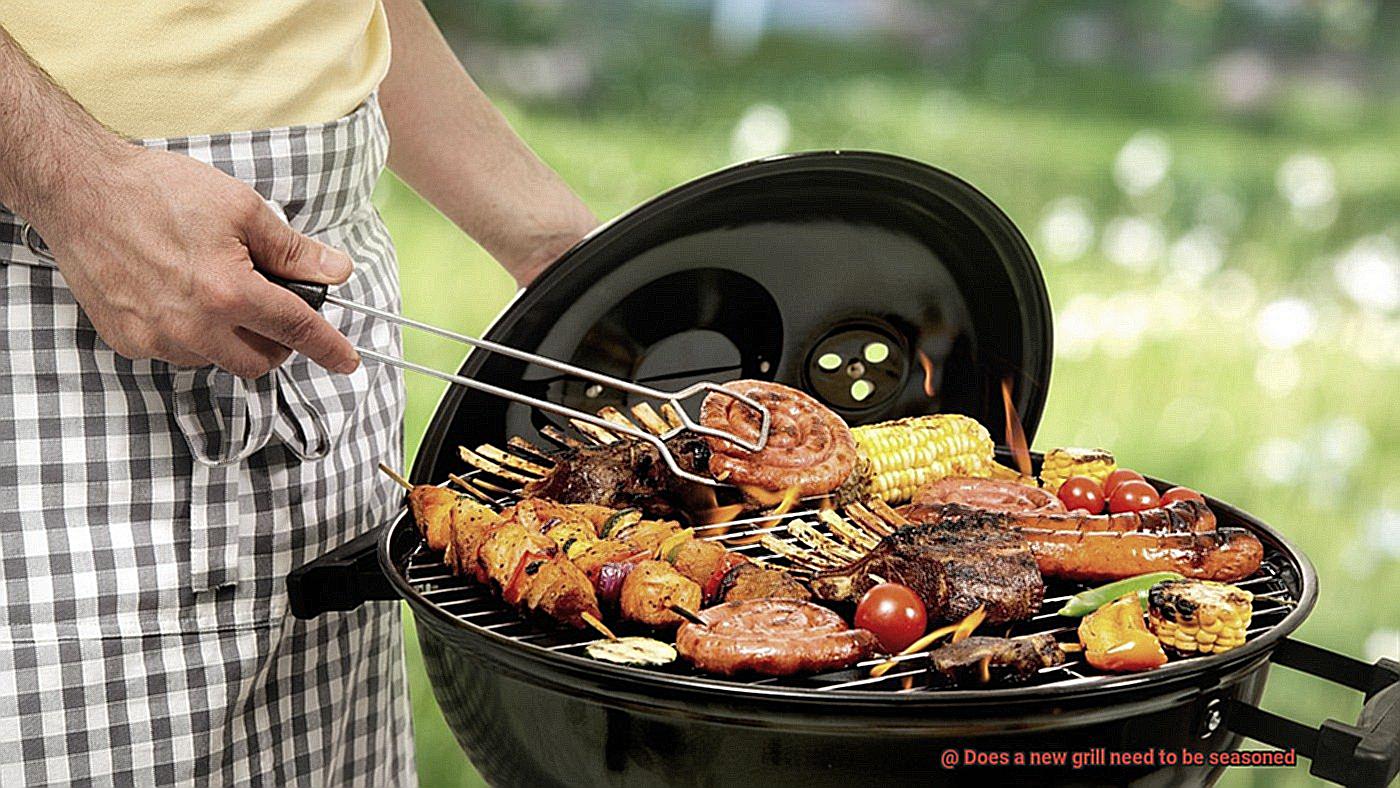
Cleaning the Grill Before Seasoning
Neglecting to do so may result in an unpleasant taste and odor on the food being cooked. Not to mention, it can also reduce the lifespan of your grill. Here’s a step-by-step guide on how to clean your new grill before seasoning it.
Step 1: Remove Packaging Materials and Inspect
Before starting, remove any packaging materials from your grill and confirm that it is in good condition. Checking for any damage or missing parts at this stage can prevent any hassle later on.
Step 2: Use a Wire Brush or Scraper
To ensure that your food doesn’t stick to the grates, use a wire brush or scraper to remove any debris or rust from the grates and inside surfaces of the grill. This step can also prevent any unpleasant flavors from being transferred to your food.
Step 3: Wipe Down with Warm Soapy Water
Using warm soapy water and a damp cloth or sponge, wipe down the grates and surfaces of the grill thoroughly. This step is crucial in removing any manufacturing oils and debris that may have accumulated during transportation and storage. Be sure to rinse thoroughly to remove any soap residue.
Step 4: Use a Special Cleaner or Degreaser
In case of stubborn stains or grease buildup, some grills come with a special cleaner or degreaser. Follow the manufacturer’s instructions carefully when using these products.
Step 5: Let It Dry Completely
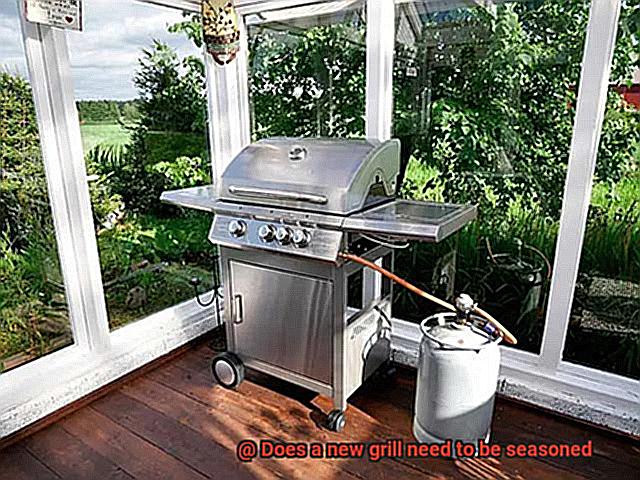
After cleaning, it’s essential to let your grill dry completely before seasoning it. You can do this by letting it sit in the sun for a few hours or using a clean towel or cloth to dry it off. This step ensures that the seasoning oil adheres properly to the surface of the grill.
How to Season a New Grill?
Seasoning helps create a non-stick surface on the grill grates, making it easier to clean and maintain while also improving the flavor of your food. Here are five sub-sections with tips from an expert on how to season a new grill:
Clean the Grill Grates
Start by cleaning the grill grates thoroughly with a wire brush to remove any dirt, debris, or manufacturing residue. This will ensure that your grates are clean and ready for seasoning. You don’t want any unwanted particles sticking to your food.
Apply Oil to the Grates
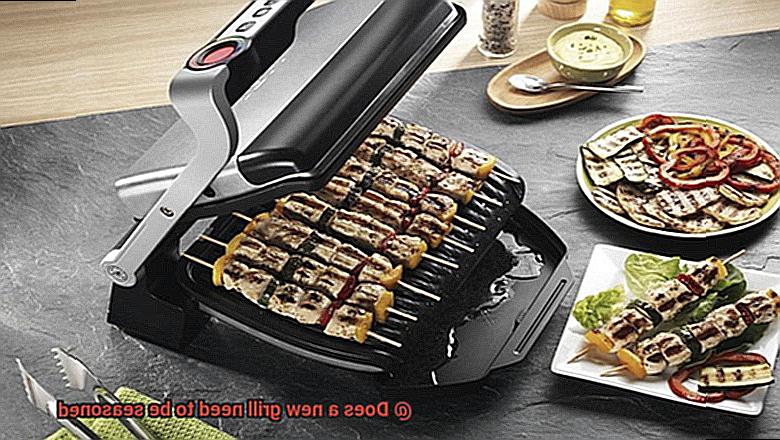
Once the grates are clean, coat them with a high-temperature oil like canola or vegetable oil. Use a paper towel or brush to spread the oil evenly across the grates. This will help create a non-stick surface on the grates and prevent food from sticking.
Heat Up the Grill
Preheat your grill to a high temperature for about 15-20 minutes. This will help to burn off any excess oil and create a non-stick surface on the grates. Be sure to keep the lid closed during this process to maximize heat retention.
Let the Grates Cool
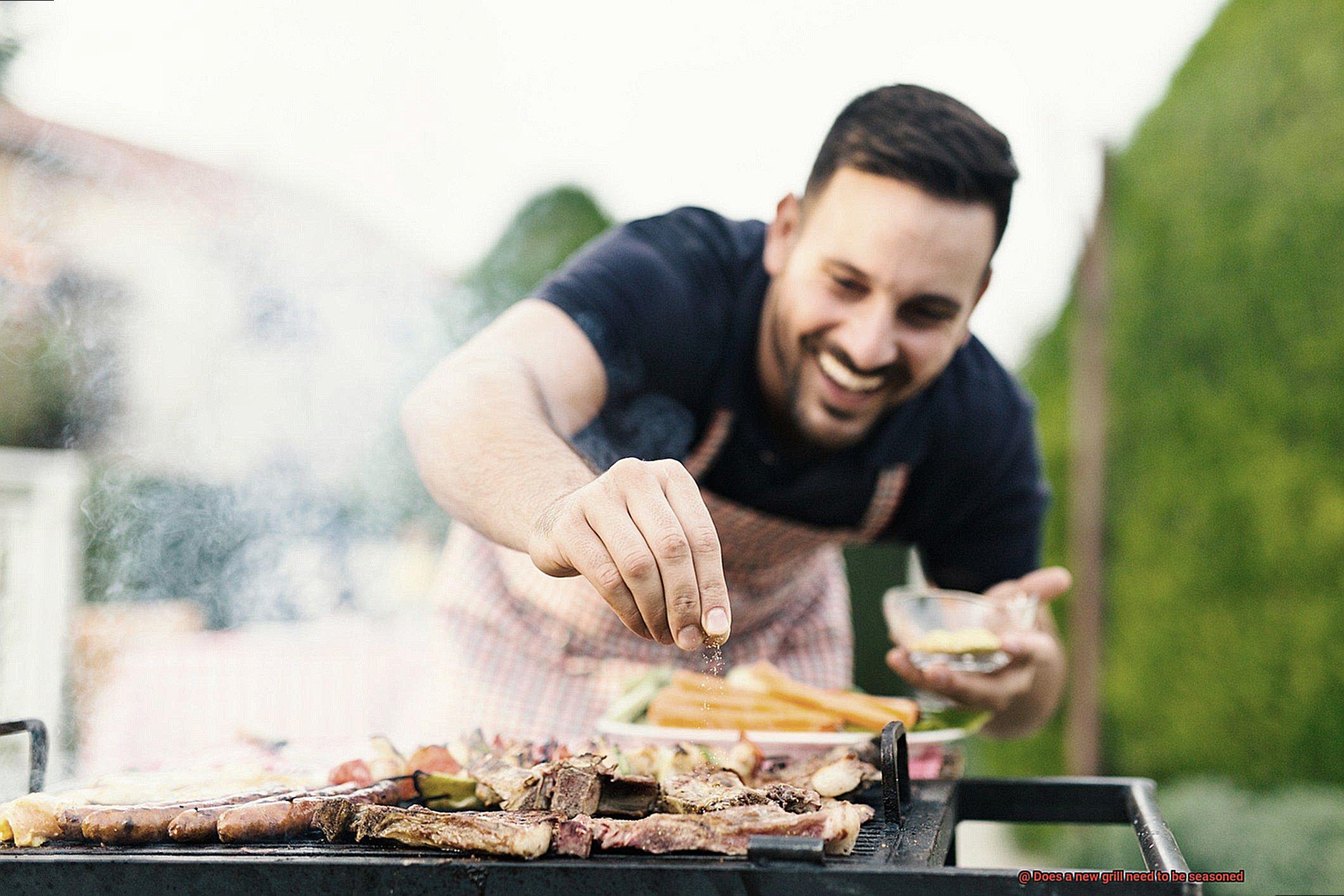
Once you’ve heated up the grill, turn off the heat and let the grates cool down for a few minutes. You want them to be warm but not too hot to handle. This is also a good time to wipe down any excess oil with a clean cloth or paper towel.
Repeat the Process
It’s important to note that you should repeat this seasoning process periodically throughout the life of your grill, especially after cleaning it with harsh chemicals or if you notice food starting to stick to the grates. A well-seasoned grill will not only make cooking easier but will also prolong the life of your grill and ensure that your food always comes out perfectly.
Benefits of Seasoning Your New Grill
Look no further than the powerful benefits of seasoning your new grill. This simple process is essential for preparing your grill for cooking and provides numerous advantages that will enhance your grilling experience.
Firstly, seasoning creates a non-stick surface that makes cooking a breeze. No more struggling to flip food or dealing with burnt-on bits. With a properly seasoned grill, food will cook evenly and slide off the grates effortlessly. This means less time spent cleaning and more time enjoying your delicious meals.
But the benefits don’t stop there. Seasoning also helps protect your grill from rust and corrosion, which can damage the metal and decrease its lifespan. By creating a barrier between the metal and the elements, moisture is prevented from penetrating the surface and causing harm. This means you can enjoy your grill for years to come without worrying about damage or replacement costs.
And let’s not forget about taste. When you cook on an unseasoned grill, residual chemicals can burn off and create an unpleasant taste or odor. But by seasoning your grill, these chemicals are removed, and a subtle flavor from the oil used in the process is imparted onto your food. This means that your meals will not only look great but taste even better.
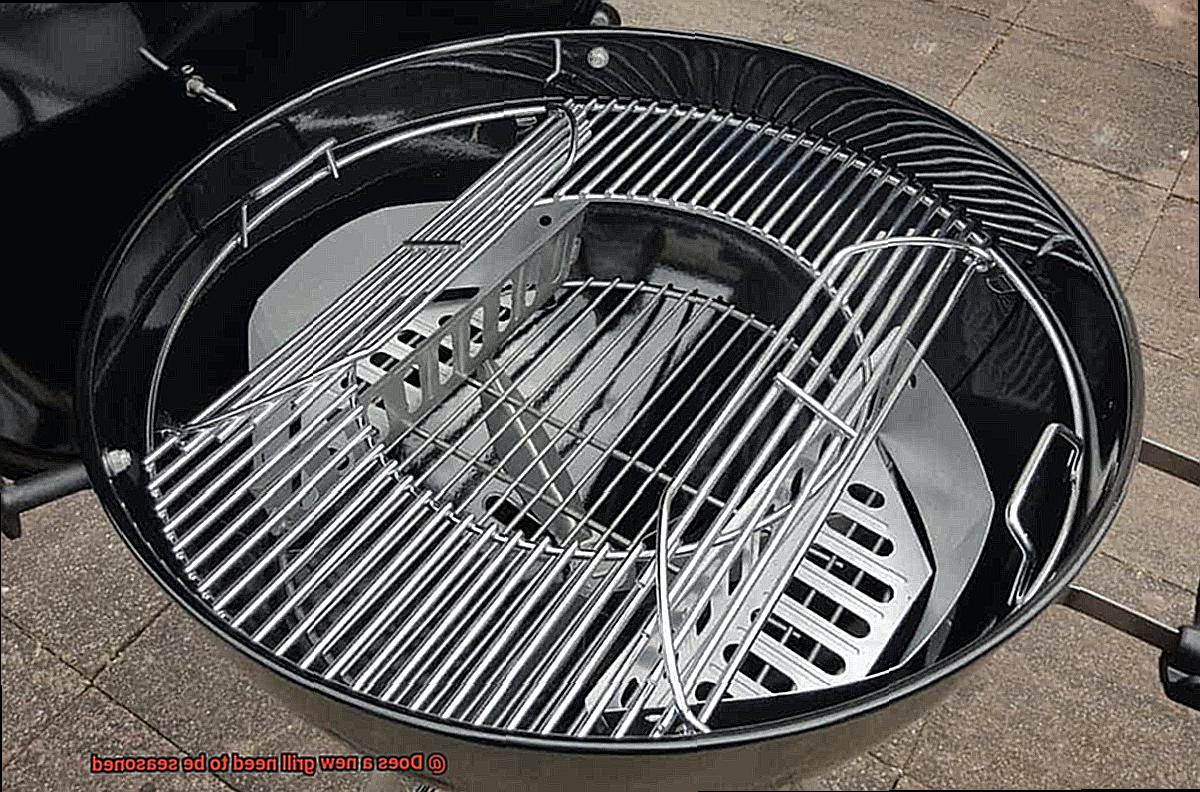
Common Mistakes When Seasoning a New Grill
Before you start cooking up a storm on your brand new grill, there is an important step that you don’t want to overlook – seasoning. However, seasoning a new grill can be a daunting task, especially if you’re not aware of the common mistakes that people make. To help you avoid these pitfalls and achieve the perfect seasoning, we have compiled a list of the most common mistakes when seasoning a new grill.
First and foremost, make sure to clean your grill thoroughly before seasoning it. This is an essential step that many people neglect. A dirty grill can lead to a buildup of dirt and debris, which can affect the flavor of your food and even cause flare-ups. Therefore, it’s important to give your grill a good scrub down before you start seasoning.
Next up, let’s talk about oil. One of the most common mistakes people make is using too much oil or not using enough oil when seasoning their grills. If you use too much oil, your grill will smoke excessively, which can be unpleasant and even hazardous. On the other hand, if you don’t use enough oil, your grill won’t be properly seasoned, and your food will stick to the grates. So, it’s crucial to use just enough oil to create a thin layer across the grates.
Moreover, another mistake to avoid is not heating your grill for long enough before applying the oil. It’s vital to heat your grill properly before seasoning it because this will help open up the pores in the metal and allow the oil to penetrate more deeply. If you skip this step or don’t heat your grill long enough, you’ll end up with an uneven seasoning that can negatively impact the taste and texture of your food.
Last but not least, choosing the right oil for seasoning your grill is critical. Using low-quality oil can be dangerous and cause excessive smoking or even fires. Therefore, it’s recommended to use high-quality oils with high smoke points like vegetable or canola oil. These oils won’t negatively impact the quality of your food and will help you achieve the perfect seasoning.
yE7T2Zkeyqw” >
Conclusion
In conclusion, the debate over whether to season a new grill is one that has been raging among grilling enthusiasts for years. However, as an expert on the subject, I can confidently say that seasoning your grill is not just important but crucial for achieving the perfect cookout. The process of seasoning involves coating the grates with oil and heating them up to create a non-stick surface that prevents food from sticking and protects against rust and corrosion.
To properly season your new grill, start by giving it a thorough cleaning with warm soapy water. Then, use a brush or paper towel to coat the grates with oil before heating up the grill to a high temperature for about 15-20 minutes until the oil starts smoking. Once done, turn off the heat and let the grill cool down completely before wiping off any excess oil with a clean paper towel.
Seasoning your new grill comes with several benefits, including creating a non-stick surface that makes cooking easier while also protecting against rust and corrosion to prolong its lifespan. Additionally, it enhances the flavor of your food by removing residual chemicals from manufacturing processes.
However, there are some common mistakes people make when seasoning their new grill. These include neglecting to clean it thoroughly beforehand, using too much or too little oil, not heating up the grill long enough before applying oil, and choosing low-quality oils.
By avoiding these pitfalls and following proper seasoning techniques regularly throughout your grill’s life, you’ll be able to enjoy perfectly cooked meals for years to come.

